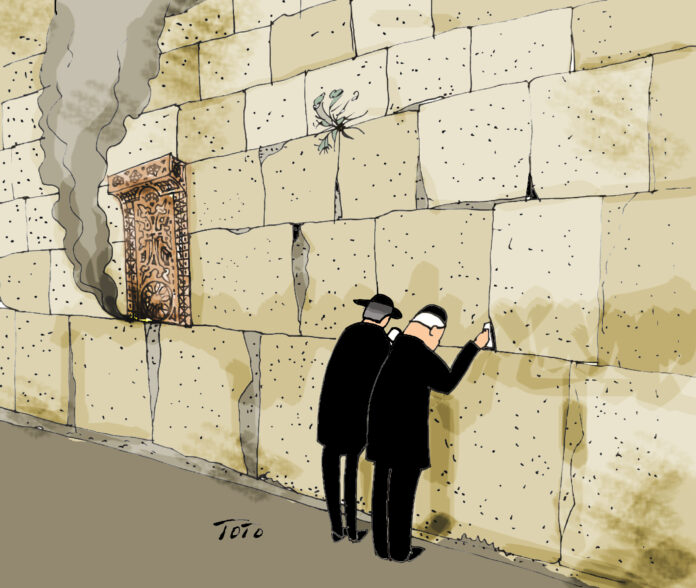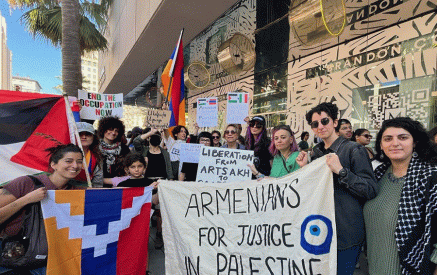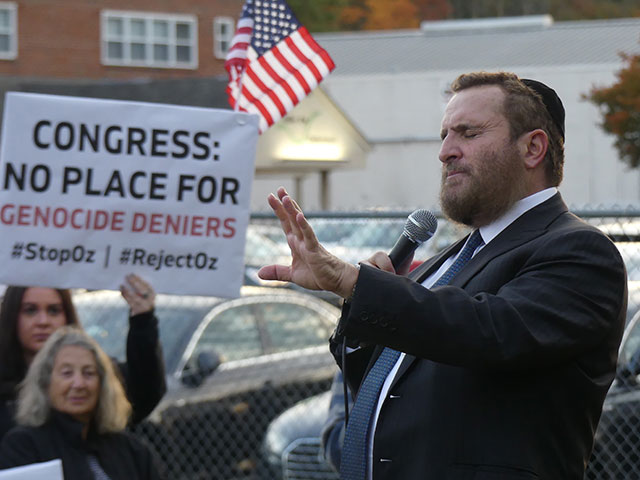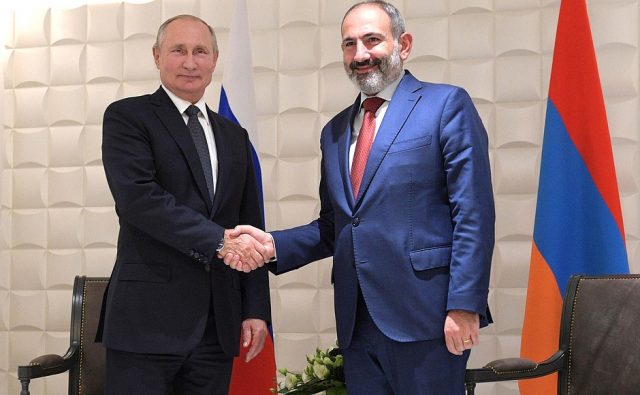by Edmond Y. Azadian
News of incidents which took place in Jerusalem on January 27 through 29 have alarmed the world Armenian community, as a group of extremist Jewish settlers have attacked an Armenian restaurant and the Armenian Patriarchate, shouting incendiary slogans, such as “Death to the Arabs, Death to the Christians.”
Read also
When cornered in this recent incident, the Armenians, who trace their history in the Holy City to the sixth century AD, reminded their attackers, who asked a group in the Armenian Quarter to leave the country, that this was their neighborhood. The attackers shouted back, “You don’t have a neighborhood here. This is our country. Get out.”
This is not a new phenomenon, as these attacks have been taking place for many years. This new surge is the reflection of the new extremist Israeli government, some of whose members come from the same xenophobic quarters as the assailants. While Palestinian youth are sentenced to long prison terms for having thrown stones, the police stations only present a revolving door for such settler attackers.
Since the Genocide and the accompanying deportations, the Jerusalem Armenian community had been holding steady at 15,000-strong, sometimes numbering even higher. The fact that the community has shrunk today to fewer than 1,500 indicates that indeed, they “don’t have a neighborhood here.”
Armenians and Jews have been bound together by fate as two victims of mass genocides in the 20th century. And this bond is strong, despite the divergence of their politics over the years. The fact that the Israeli government has refused to recognize the Armenian Genocide angers the majority of Jews inside Israel and around the world, as it does Armenians.
During the recent 44-Day War, Israel was a partner in crime with Azerbaijan, not only by providing deadly drones to the Baku government, but also sometimes operating those drones, which killed thousands of Armenians. In one instance, the manufacturer of the Israeli drones Aeronautics Ltd., was caught red-handed in 2017 demonstrating the power of their suicide drones by sending them into Armenia to attack army positions as part of its sales pitch, and only received a slap on the wrist.
Despite this alignment with Azerbaijan, after the incident, Armenia recognized Israel’s clout and political influence in the region. Thus, it took a calculated risk and returned its ambassador to Israel, despite the concerns of the Armenian communities in the Arab world and that of Iran, one of Armenia’s only friendly neighbors.
It turns out that the Armenians have become collateral damage for Israel, both domestically and internationally, as the religious extremists have created an identity crisis for Israel. They insist on the need to define who is a Jew, and therefore who is entitled to become a citizen of Israel. On the other hand, Armenia has fallen on the wrong side of politics as Iran’s friend, a country with whom new (and former) Israeli leader Benjamin Netanyahu is itching to engage in a major confrontation.
Netanyahu has returned to power by cobbling together a coalition of ultra-Orthodox and xenophobic parties. This kind of collation is an explosive one and has the potential to create both domestic problems and tensions in working with the Biden administration.
Secretary of State Antony Blinken, who is visiting Israel and the region at this tense time, is pledging, like all US diplomats, Washington’s ironclad commitment to Israel’s “security,” which is a license for Mr. Netanyahu to enter into any conflict, pulling in the US behind it.
In an interview with the Times of Israel, Thomas Nides, the US ambassador to Israel, said, “The United States hopes Mr. Netanyahu can help to avoid actions that will make cooperating with the Biden administration more difficult.”
The ambassador, continuing his comments, added: “It is unclear how much control Mr. Netanyahu has over this coalition, which functions with a razor-margin majority in parliament, or whether he will have to accommodate its most conservative members to remain in power.”
The prime minister’s answer to that is: “They came to me; I did not go to them.”
As if the activities and religion-driven ideologies of the extremist groups were not enough, Mr. Netanyahu is on a campaign to reform the judiciary, weakening the power of the country’s Supreme Court, which is quite independent, through giving authority to the parliament to overrule that body’s decisions. This will erode the foundations of democracy, claim liberal Israelis. The first beneficiary of that change will be Netanyahu himself, who has been indicted on three cases of bribery and fraud, which could potentially go before the Supreme Court.
This move has alarmed the Israelis who have resorted to protest marches with more than 100,000 participants. The action has reverberated all the way to New York, where crowds gathered in Washington Square, chanting, “Democracy now and for all” and “Fascism is not OK.”
It is apparent that this xenophobic wave is not directed particularly towards Armenians but all citizens of Israel. That is why Amir Tibon has written in Ha’aretz, a column whose title says it all: “Netanyahu promised order. Instead, he brought chaos.”
As a sign of instability, tensions with Palestinians are rising, with Mr. Netanyahu warning even tougher measures, while Palestinians, particularly the 2 million in the Gaza Strip, live in a virtual prison camp. There are 4,450 Palestinian prisoners in Israel, including 160 children, 32 women and 530 “administrative detainees,” meaning incarcerated without charges. Most are serving long sentences just for having thrown stones at police. Making their lives more miserable does not guarantee peaceful lives for the Israelis.
Since the new election has caused serious domestic fragmentation in Israel, the new prime minister seems like he is intending a major escalation in the region to rally the nation around him.
Mr. Netanyahu had very tense relations with the Obama administration over the nuclear deal with Iran. President Obama’s intent was to contain Iran’s nuclear ambitions through negotiations, while Mr. Netanyahu preferred a preemptive strike. The Trump administration withdrew from the nuclear deal, allowing Iran to continue developing its nuclear program, and thus providing a casus belli to Mr. Netanyahu.
On a broader scale, the Arab Spring offered two choices to the Middle Eastern nations: either suffer the fate of Saddam Hussein and Qaddafi or make peace with Israel. And all the kings, princes, potentates and emirs who cherish their golden bathrooms more than the Palestinian cause, lined up for the Abraham Accords and began establishing diplomatic relations with Israel. The only pariah who was left out was Iran, whose time seems to be up at this point as Israeli drones are hitting military installations in that country.
It seems the theocracy in power now in Israel is ready to confront the Shia theocracy in Iran.
Recently, three unprecedented war games were conducted with the combined forces of the US and Israel. Visits to the region by CIA Director William Burns and Secretary of State Blinken seem to lay the groundwork for an escalation rather than taming Israel.
Azerbaijan, which just this month sent its first ambassador to Israel, and Turkey, have been watching with whetted appetites as they would be stakeholders of the loot from an Iran-Israel war, just as Israel became a stakeholder in the loot from the 44-day war of 2020. That war expanded the Iran-Azerbaijan border by more than 150 kms, allowing Israel greater surveillance possibilities against Iran, and allowing the building of military airports on recaptured territory. There was hardly any urgent need for those airports for the Azerbaijani military. Meanwhile, President Ilham Aliyev of Azerbaijan has been openly laying claim not only to the territory of the Republic of Armenia but also to northern Iran.
Even if Armenia is not part of Israel’s war plans, it will become one of the unintended casualties as a friend of Iran.
Incidentally, Iran has openly challenged any claim on Armenia’s territory, a defiance whose impact will become questionable should war break out.
Mr. Netanyahu has his hands full. The rise of religious extremism is a challenge to Israel’s democracy, before being a threat to Armenians, Christians and Arabs in the country.
If he can manage the chaos, which is of his own making, inside and outside Israel and maintain healthy relations with the US, that will come to prove his extraordinary skills in statesmanship.




























































